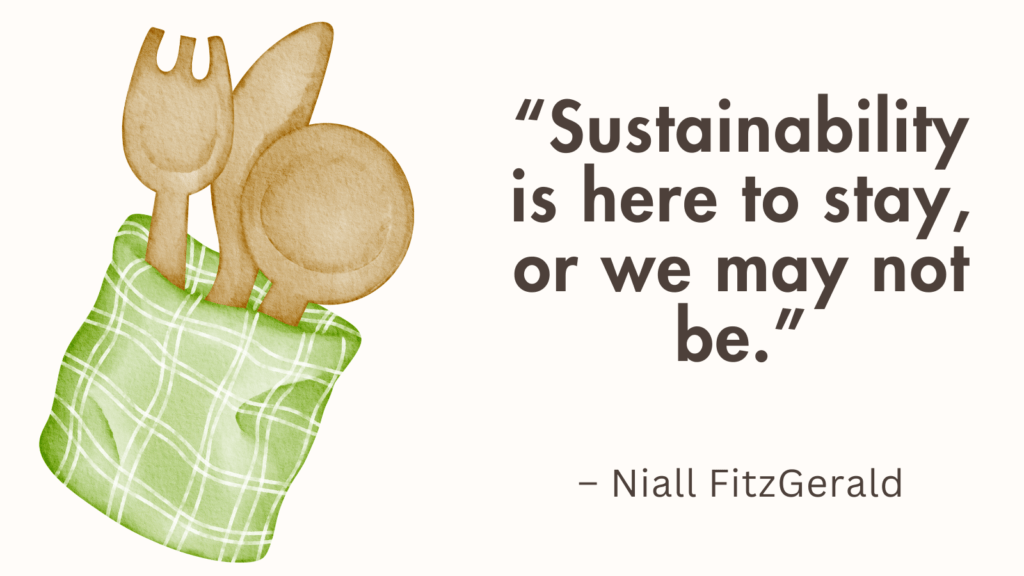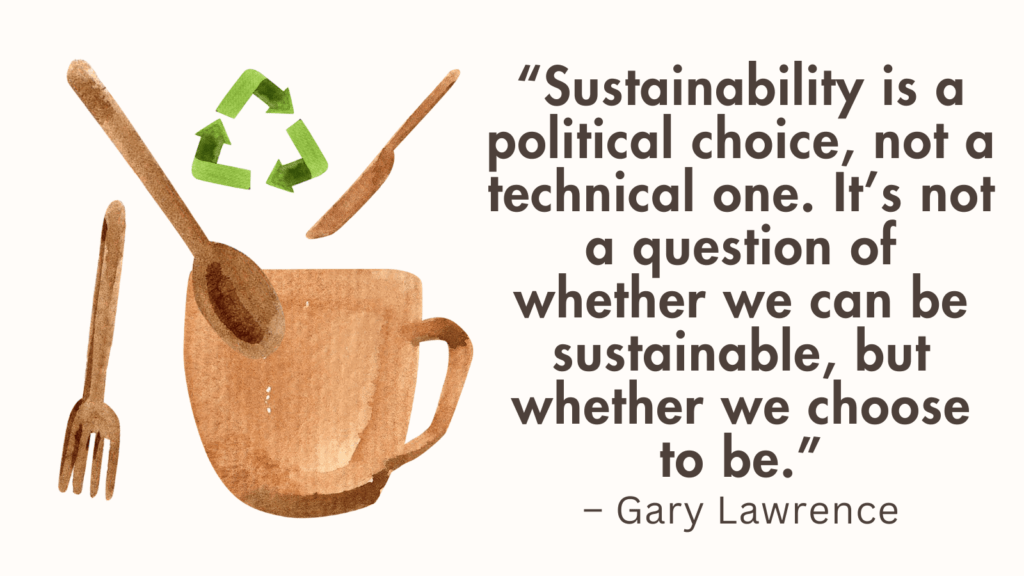In this post, you’re going to learn how to eat sustainably on a budget.
What Does It Mean to Eat Sustainably?
Eating sustainably refers to making food choices that have a positive impact on the environment, society, and personal well-being.
It involves considering the entire life cycle of the food, from production to consumption, and aiming to minimize negative environmental and social consequences.
How to Eat Sustainably on a Budget?
Eating sustainably on a budget is not only possible but also beneficial for both your health and the environment. Here are some tips to help you eat sustainably without breaking the bank:
1. Choose whole and minimally processed foods
Opting for whole foods like fruits, vegetables, whole grains, and legumes instead of heavily processed or packaged foods reduces energy and resource consumption associated with processing and packaging.
2. Plan your meals
Take some time each week to plan your meals and create a shopping list accordingly. This will help you avoid impulsive purchases and reduce food waste.
3. Cook at home
Eating out or ordering takeout can be expensive and often results in excess packaging waste.
Cooking at home allows you to have control over the ingredients, portion sizes, and reduces reliance on processed foods.
4. Support local and seasonal produce
Buying locally grown and seasonal foods reduces the carbon footprint associated with transportation and supports local farmers and the local economy.
Local and seasonal produce tends to be more affordable compared to imported or out-of-season options.
Visit farmers’ markets or join Community Supported Agriculture (CSA) programs to access fresh, locally grown produce.
5. Minimize food waste
Reducing food waste by planning meals, properly storing leftovers, and using all parts of ingredients helps conserve resources like water, energy, and land that go into producing food.
It also reduces greenhouse gas emissions generated from food waste in landfills.
6. Choose sustainably sourced proteins
Opting for sustainably sourced seafood and ethically raised animal products reduces the negative environmental and social impacts associated with commercial fishing and factory farming.
7. Prioritize plant-based options
Incorporating more plant-based meals in your diet reduces the reliance on resource-intensive animal agriculture.
Plant-based proteins tend to have a lower carbon and water footprint compared to animal-based proteins.
8. Consider packaging and waste
Choosing products with minimal packaging, opting for reusable or recyclable packaging, and avoiding single-use plastics helps reduce waste and litter that harm the environment.
9. Purchase in bulk
Buying staples like grains, legumes, and nuts in bulk allows you to save money and reduce packaging waste.
Look for stores or co-ops that offer bulk options and bring your own reusable containers.
10. Reduce food waste
Make an effort to minimize food waste by storing leftovers properly, using vegetable scraps for stock, and incorporating “ugly” or less aesthetically pleasing produce into meals.
Be mindful of expiration dates and rotate older items to the front of your pantry and fridge.
11. Preserve and freeze food
When you have excess produce or leftovers, consider preserving them through methods like freezing, canning, or pickling.
This way, you can extend their shelf life and have them on hand for future meals.
12. Grow your own food
Starting a garden or growing your own herbs and vegetables allows you to have fresh, organic produce and reduces the environmental impact of transportation and industrial agriculture.
13. Support fair trade and ethical practices
Choosing foods that are produced under fair trade conditions ensures fair wages and better working conditions for farmers and workers, as well as social and environmental sustainability within the supply chain.
14. Conserve water and energy
Being mindful of water usage when cooking, choosing energy-efficient cooking methods, and reducing food waste all help conserve water and energy resources.
Related: Does Sustainable Mean Eco Friendly?
Conclusion
Eating sustainably is a mindful and holistic approach to nourishing ourselves that takes into account the planet and future generations, as well as our own health and well-being.
FAQ
Is eating organic food necessary for sustainable eating?
While eating organic food is one way to support sustainable agriculture, it is not necessary for sustainable eating.
Sustainable eating involves considering the environmental impact of our food choices, including factors such as pesticide use, water conservation, and soil health.
Organic farming methods align with these principles, but there are other sustainable practices that can be followed as well.
Are vegetarian or vegan diets more sustainable?
Both vegetarian and vegan diets have been shown to be more environmentally sustainable compared to diets high in animal products.
Plant-based diets generally require fewer resources, such as land, water, and energy, and produce lower greenhouse gas emissions.
However, it’s important to note that sustainable eating also involves considering the sourcing and production methods of plant-based foods to ensure they align with ecological and ethical standards.
Are there sustainable alternatives to plastic packaging?
Yes, there are various sustainable alternatives to plastic packaging.
Some examples include using biodegradable or compostable packaging materials, opting for reusable containers, utilizing paper or cardboard packaging, or exploring innovative packaging solutions made from renewable resources.
It’s important to look for packaging that is recyclable, has minimal environmental impact, and is sourced sustainably.
How can I eat sustainably if I don’t have access to fresh produce?
If you don’t have access to fresh produce, there are still ways to eat sustainably.
You can explore options such as frozen fruits and vegetables, which often retain their nutritional value and can reduce food waste.
Another approach is to focus on dried foods like legumes, whole grains, and nuts, which have a longer shelf life and can be nutritious.
Additionally, consider supporting local farmers’ markets, community-supported agriculture (CSA) programs, or growing your own herbs and vegetables through container gardening or indoor farming.
Does eating sustainably mean I have to give up certain foods?
Eating sustainably does not necessarily mean giving up all foods.
It’s more about making conscious choices and understanding the environmental impact of our food choices.
While certain foods may have higher carbon footprints or require more resources to produce, it’s important to focus on overall balance and moderation.
You can still enjoy a wide range of foods while prioritizing those that align with sustainability principles, such as locally sourced, seasonal, minimally processed, and plant-based options.
Can I still enjoy treats and desserts while eating sustainably?
Absolutely! You can still enjoy treats and desserts while eating sustainably.
There are many sustainable alternatives available such as choosing organic and fair-trade ingredients, making your own treats at home to reduce packaging waste, or supporting local bakeries and businesses that prioritize sustainable practices.
How can I avoid single-use plastics while grocery shopping?
To avoid single-use plastics while grocery shopping, consider bringing your own reusable bags for produce and groceries.
Opt for products with minimal packaging or choose items packaged in recyclable materials, glass, or paper.
Buying in bulk can also help reduce plastic waste.
Additionally, you can look for stores that offer refill stations for pantry staples like grains, spices, and oils, where you can bring your own containers and avoid unnecessary packaging altogether.
What are some sustainable options for food storage?
When it comes to food storage, there are sustainable options to consider.
Glass jars or containers are an excellent alternative to plastic containers, as they are durable, reusable, and safe for storing food.
Beeswax wraps or silicone food covers can be used instead of plastic wrap or aluminum foil.
Additionally, investing in a set of reusable silicone or fabric food storage bags can help reduce the need for disposable plastic bags.
How can I find sustainable food options when dining out?
Finding sustainable food options when dining out may require a little research, but it’s worth it.
Look for restaurants that prioritize locally sourced, seasonal, and organic ingredients. Farm-to-table establishments often have a focus on sustainability.
Another option is to support plant-based or vegetarian restaurants, as these diets tend to have a lower environmental impact.
Can eating sustainably improve my personal health?
Yes, eating sustainably can have a positive impact on your personal health.
Sustainable eating often involves consuming more whole, unprocessed foods like fruits, vegetables, whole grains, and plant-based proteins.
These foods are rich in nutrients, fiber, and antioxidants, which can support your overall health and well-being.
Additionally, sustainable eating encourages reducing the consumption of processed and packaged foods that are typically high in unhealthy fats, added sugars, and artificial ingredients.
How can I engage my children in sustainable eating practices?
Engaging your children in sustainable eating practices can be both educational and fun.
Teach them about the importance of choosing locally grown and organic produce, involve them in meal planning and cooking, and encourage them to try new fruits and vegetables.
You can also take them to farmers markets or engage in gardening activities to help them understand where their food comes from. Remember to lead by example and make sustainable eating a family affair.
How can I reduce my energy consumption while cooking?
To reduce energy consumption while cooking, there are a few practices you can adopt.
Use lids on pots and pans to retain heat and cook food faster.
Consider using smaller appliances like toaster ovens or microwaves for smaller meals instead of the oven.
Opt for energy-efficient appliances that have the ENERGY STAR label. When using the stove, match the pot size to the burner size to prevent energy loss.
Lastly, embrace cooking methods like steaming or stir-frying, which tend to be more energy-efficient compared to boiling or baking.
Related: How To Shop Sustainably On A Budget?

Garden Cart
*As an Amazon Associate I earn from qualifying purchases, at zero cost to you, if you click through the link and finalize a purchase.





